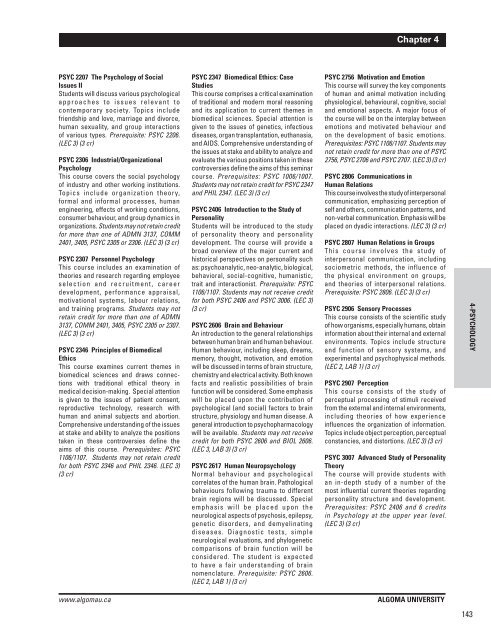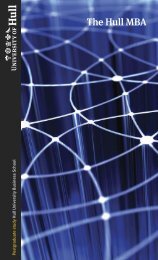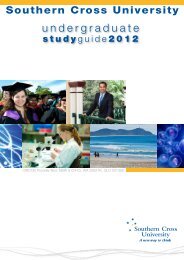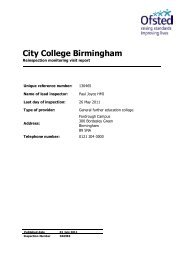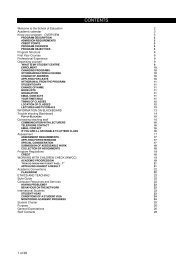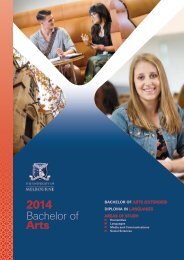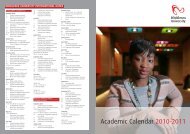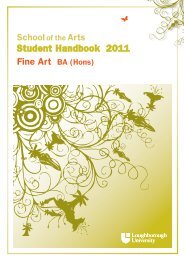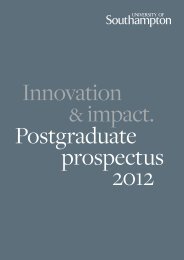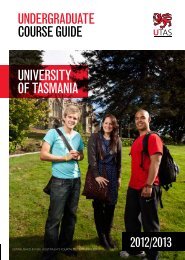Create successful ePaper yourself
Turn your PDF publications into a flip-book with our unique Google optimized e-Paper software.
Chapter 4<br />
PSYC 2207 The Psychology of Social<br />
Issues II<br />
Students will discuss various psychological<br />
approaches to issues relevant to<br />
contemporary society. Topics include<br />
friendship and love, marriage and divorce,<br />
human sexuality, and group interactions<br />
of various types. Prerequisite: PSYC 2206.<br />
(LEC 3) (3 cr)<br />
PSYC 2306 Industrial/Organizational<br />
Psychology<br />
This course covers the social psychology<br />
of industry and other working institutions.<br />
Topics include organization theory,<br />
formal and informal processes, human<br />
engineering, effects of working conditions,<br />
consumer behaviour, and group dynamics in<br />
organizations. Students may not retain credit<br />
for more than one of ADMN 3<strong>13</strong>7, COMM<br />
2401, 3405, PSYC 2305 or 2306. (LEC 3) (3 cr)<br />
PSYC 2307 Personnel Psychology<br />
This course includes an examination of<br />
theories and research regarding employee<br />
selection and recruitment, career<br />
development, performance appraisal,<br />
motivational systems, labour relations,<br />
and training programs. Students may not<br />
retain credit for more than one of ADMN<br />
3<strong>13</strong>7, COMM 2401, 3405, PSYC 2305 or 2307.<br />
(LEC 3) (3 cr)<br />
PSYC 2346 Principles of Biomedical<br />
Ethics<br />
This course examines current themes in<br />
biomedical sciences and draws connections<br />
with traditional ethical theory in<br />
medical decision-making. Special attention<br />
is given to the issues of patient consent,<br />
reproductive technology, research with<br />
human and animal subjects and abortion.<br />
Comprehensive understanding of the issues<br />
at stake and ability to analyze the positions<br />
taken in these controversies define the<br />
aims of this course. Prerequisites: PSYC<br />
1106/1107. Students may not retain credit<br />
for both PSYC 2346 and PHIL 2346. (LEC 3)<br />
(3 cr)<br />
PSYC 2347 Biomedical Ethics: Case<br />
Studies<br />
This course comprises a critical examination<br />
of traditional and modern moral reasoning<br />
and its application to current themes in<br />
biomedical sciences. Special attention is<br />
given to the issues of genetics, infectious<br />
diseases, organ transplantation, euthanasia,<br />
and AIDS. Comprehensive understanding of<br />
the issues at stake and ability to analyze and<br />
evaluate the various positions taken in these<br />
controversies define the aims of this seminar<br />
course. Prerequisites: PSYC 1006/1007.<br />
Students may not retain credit for PSYC 2347<br />
and PHIL 2347. (LEC 3) (3 cr)<br />
PSYC 2406 Introduction to the Study of<br />
Personality<br />
Students will be introduced to the study<br />
of personality theory and personality<br />
development. The course will provide a<br />
broad overview of the major current and<br />
historical perspectives on personality such<br />
as: psychoanalytic, neo-analytic, biological,<br />
behavioral, social-cognitive, humanistic,<br />
trait and interactionist. Prerequisite: PSYC<br />
1106/1107. Students may not receive credit<br />
for both PSYC 2406 and PSYC 3006. (LEC 3)<br />
(3 cr)<br />
PSYC 2606 Brain and Behaviour<br />
An introduction to the general relationships<br />
between human brain and human behaviour.<br />
Human behaviour, including sleep, dreams,<br />
memory, thought, motivation, and emotion<br />
will be discussed in terms of brain structure,<br />
chemistry and electrical activity. Both known<br />
facts and realistic possibilities of brain<br />
function will be considered. Some emphasis<br />
will be placed upon the contribution of<br />
psychological (and social) factors to brain<br />
structure, physiology and human disease. A<br />
general introduction to psychopharmacology<br />
will be available. Students may not receive<br />
credit for both PSYC 2606 and BIOL 2606.<br />
(LEC 3, LAB 3) (3 cr)<br />
PSYC 2617 Human Neuropsychology<br />
Normal behaviour and psychological<br />
correlates of the human brain. Pathological<br />
behaviours following trauma to different<br />
brain regions will be discussed. Special<br />
emphasis will be placed upon the<br />
neurological aspects of psychosis, epilepsy,<br />
genetic disorders, and demyelinating<br />
diseases. Diagnostic tests, simple<br />
neurological evaluations, and phylogenetic<br />
comparisons of brain function will be<br />
considered. The student is expected<br />
to have a fair understanding of brain<br />
nomenclature. Prerequisite: PSYC 2606.<br />
(LEC 2, LAB 1) (3 cr)<br />
PSYC 2756 Motivation and Emotion<br />
This course will survey the key components<br />
of human and animal motivation including<br />
physiological, behavioural, cognitive, social<br />
and emotional aspects. A major focus of<br />
the course will be on the interplay between<br />
emotions and motivated behaviour and<br />
on the development of basic emotions.<br />
Prerequisites: PSYC 1106/1107. Students may<br />
not retain credit for more than one of PSYC<br />
2756, PSYC 2706 and PSYC 2707. (LEC 3) (3 cr)<br />
PSYC 2806 Communications in<br />
Human Relations<br />
This course involves the study of interpersonal<br />
communication, emphasizing perception of<br />
self and others, communication patterns, and<br />
non-verbal communication. Emphasis will be<br />
placed on dyadic interactions. (LEC 3) (3 cr)<br />
PSYC 2807 Human Relations in Groups<br />
This course involves the study of<br />
interpersonal communication, including<br />
sociometric methods, the influence of<br />
the physical environment on groups,<br />
and theories of interpersonal relations.<br />
Prerequisite: PSYC 2806. (LEC 3) (3 cr)<br />
PSYC 2906 Sensory Processes<br />
This course consists of the scientific study<br />
of how organisms, especially humans, obtain<br />
information about their internal and external<br />
environments. Topics include structure<br />
and function of sensory systems, and<br />
experimental and psychophysical methods.<br />
(LEC 2, LAB 1) (3 cr)<br />
PSYC 2907 Perception<br />
This course consists of the study of<br />
perceptual processing of stimuli received<br />
from the external and internal environments,<br />
including theories of how experience<br />
influences the organization of information.<br />
Topics include object perception, perceptual<br />
constancies, and distortions. (LEC 3) (3 cr)<br />
PSYC 3007 Advanced Study of Personality<br />
Theory<br />
The course will provide students with<br />
an in-depth study of a number of the<br />
most influential current theories regarding<br />
personality structure and development.<br />
Prerequisites: PSYC 2406 and 6 credits<br />
in Psychology at the upper year level.<br />
(LEC 3) (3 cr)<br />
4-PSYCHOLOGY<br />
www.algomau.ca<br />
ALGOMA UNIVERSITY<br />
143


